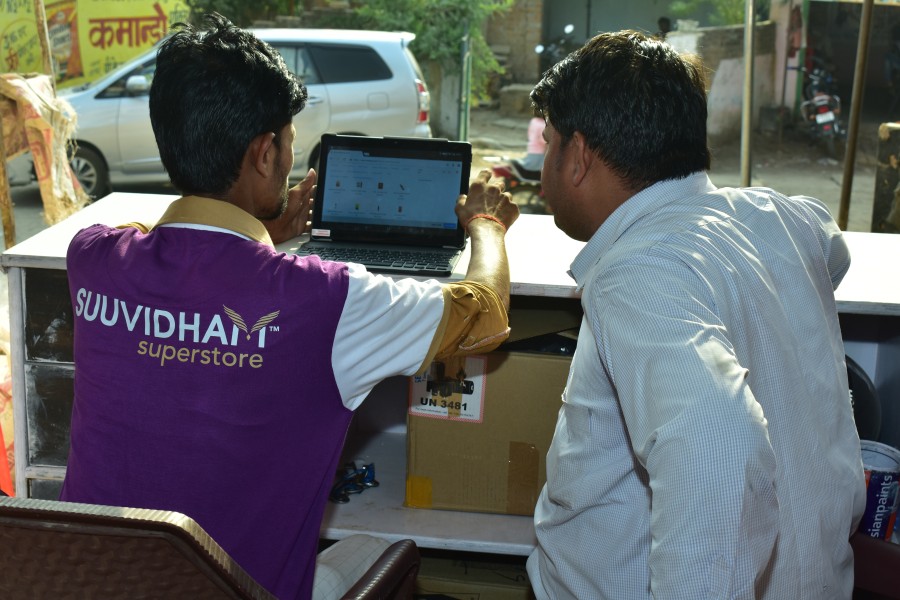

Posted on: :

Fast-moving consumer goods (FMCG) have always been the lifeblood of the retail industry, catering to the daily needs of consumers across the country. While urban markets are well-established and fiercely competitive, it is the rural markets that hold immense potential for growth and transformation. FMCG Rural Retail is the backbone of India’s rural economy, driving economic progress, employment generation, and uplifting the standard of living for millions of people. In this blog, we delve into the significance of FMCG rural retail, the challenges it faces, the strategies to harness its true potential, and how SUUVIDHAM, an innovative FMCG Rural Retail venture, is revolutionizing the market with its unique value proposition (USP).
The Significance of FMCG Rural Retail:
Rural India is home to nearly two-thirds of the country’s population and is a crucial market for FMCG companies. With rising disposable incomes, changing lifestyles, and improved infrastructure, rural consumers have become major contributors to the FMCG sector’s growth. Additionally, government initiatives like the Pradhan Mantri Gram Sadak Yojana (PMGSY) and Digital India have bolstered rural connectivity and enabled easier access to products and services.
1. Employment Generation: FMCG rural retail plays a significant role in providing employment opportunities to millions of people. From local kirana (mom-and-pop) stores to organized retail chains, the sector creates direct and indirect jobs, thereby supporting livelihoods and reducing migration to urban areas.
2. Consumer Reach: The penetration of FMCG products in rural areas has increased considerably, indicating a growing demand for brands that cater to the unique needs of rural consumers. From food and beverages to personal care products and home essentials, FMCG rural retail serves as a bridge between manufacturers and consumers in remote locations.
3. Financial Inclusion: As digital payment systems become more prevalent, FMCG rural retail acts as a crucial touchpoint for promoting financial inclusion. Through the adoption of digital payment methods, rural consumers gain access to formal financial services, creating a more inclusive economy.
Despite the immense potential, FMCG rural retail faces several challenges that require thoughtful solutions to unlock its true potential.
1. Infrastructure: Inadequate infrastructure remains a significant obstacle, hindering the seamless distribution of goods to remote areas. Poor road connectivity, unreliable power supply, and limited warehousing facilities often lead to supply chain inefficiencies and higher operational costs.
2. Reach and Awareness: Building awareness and convincing rural consumers to adopt new products can be challenging due to the diversity of languages, cultures, and consumption habits. Effective communication strategies and localized marketing campaigns are essential for bridging this gap.
3. Last-Mile Connectivity: The last mile of product delivery poses considerable logistical challenges. Developing innovative distribution models and leveraging technology for efficient last-mile connectivity is crucial for reaching the farthest corners of rural India.
Strategies for Success:
1. Localized Approach: FMCG companies need to adopt a localized approach by understanding the specific needs, preferences, and purchasing power of rural consumers. Customizing products and marketing strategies can help establish a deeper connection with the target audience.
2. Leveraging Technology: Embracing technology, such as mobile apps for ordering and digital payment systems, can streamline operations and enhance the overall shopping experience. Additionally, data analytics can provide valuable insights into consumer behavior and demand patterns.
3. Strengthening Distribution Networks: Collaborating with local retailers and distributors can strengthen the distribution network and facilitate better access to remote markets. Building strong partnerships can also help overcome trust barriers and establish brand credibility.
4. Educating and Empowering Retailers: Providing training and knowledge-sharing sessions to rural retailers can enhance their understanding of products and marketing techniques. Empowering them with the right tools and information can lead to better customer service and increased sales.
SUUVIDHAM’s Unique USP:
SUUVIDHAM, a pioneering FMCG Rural Retail venture, has revolutionized the rural retail landscape by adding unmatched value to its services.
1. Customized Buying Options: SUUVIDHAM understands the specific needs and preferences of rural consumers. By offering tailored product choices, it ensures every customer finds precisely what they require, fostering strong customer loyalty.
2. Multiple Brands Under One Roof: SUUVIDHAM brings a wide assortment of FMCG brands together in a single store. This convenience allows rural consumers to access various products without having to travel long distances, saving time and effort.
3. Local Brands for Better Margins: SUUVIDHAM takes pride in promoting and supporting local brands. By providing these brands with a platform, they gain access to a larger customer base, increasing their margins and contributing to the growth of the local economy.
4. Credit Facility: Understanding the financial constraints of rural customers, SUUVIDHAM offers a flexible credit facility. This enables consumers to purchase essential goods and repay over time, enhancing their purchasing power and improving their quality of life.
5. Delivery Assistance: SUUVIDHAM goes the extra mile by providing delivery assistance. This ensures that products reach the customers’ doorsteps promptly, even in remote areas, fostering convenience and trust.
6. Use of Technology: SUUVIDHAM embraces technology to optimize its operations and elevate the shopping experience. With mobile apps for ordering and digital payment systems, customers can transact seamlessly and efficiently.
Conclusion:
FMCG rural retail is an instrumental force in driving rural development, economic growth, and social progress in India. By recognizing the unique challenges and opportunities in this market, FMCG companies can harness the vast potential of rural India and create a win-win situation for all stakeholders. With innovative strategies and a customer-centric approach, companies like SUUVIDHAM are leading the way in empowering rural consumers with unmatched retail experiences. As FMCG companies tap into the resilience of rural retail, they contribute not only to their own growth but also to the prosperity of rural India as a whole.